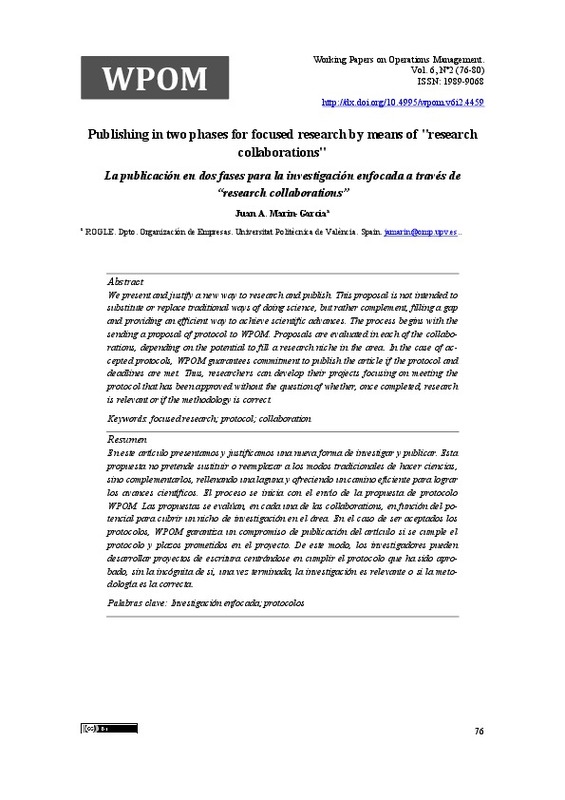JavaScript is disabled for your browser. Some features of this site may not work without it.
Buscar en RiuNet
Listar
Mi cuenta
Estadísticas
Ayuda RiuNet
Admin. UPV
Publishing in two phases for focused research by means of "research collaborations"
Mostrar el registro sencillo del ítem
Ficheros en el ítem
| dc.contributor.author | Marin-Garcia, Juan A.
|
es_ES |
| dc.date.accessioned | 2016-12-13T13:47:52Z | |
| dc.date.available | 2016-12-13T13:47:52Z | |
| dc.date.issued | 2015-12 | |
| dc.identifier.uri | http://hdl.handle.net/10251/75172 | |
| dc.description.abstract | [EN] We present and justify a new way to research and publish. This proposal is not intended to substitute or replace traditional ways of doing science, but rather complement, filling a gap and providing an efficient way to achieve scientific advances. The process begins with the sending a proposal of protocol to WPOM. Proposals are evaluated in each of the collaborations, depending on the potential to fill a research niche in the area. In the case of accepted protocols, WPOM guarantees commitment to publish the article if the protocol and deadlines are met. Thus, researchers can develop their projects focusing on meeting the protocol that has been approved without the question of whether, once completed, research is relevant or if the methodology is correct. | es_ES |
| dc.description.abstract | [ES] En este artículo presentamos y justificamos una nueva forma de investigar y publicar. Esta propuesta no pretende sustituir o reemplazar a los modos tradicionales de hacer ciencias, sino complementarlos, rellenando una laguna y ofreciendo un camino eficiente para lograr los avances científicos. El proceso se inicia con el envío de la propuesta de protocolo WPOM. Las propuestas se evalúan, en cada una de las collaborations, en función del potencial para cubrir un nicho de investigación en el área. En el caso de ser aceptados los protocolos, WPOM garantiza un compromiso de publicación del artículo si se cumple el protocolo y plazos prometidos en el proyecto. De este modo, los investigadores pueden desarrollar proyectos de escritura centrándose en cumplir el protocolo que ha sido aprobado, sin la incógnita de si, una vez terminada, la investigación es relevante o si la metodología es la correcta. | es_ES |
| dc.language | Español | es_ES |
| dc.publisher | Universitat Politècnica de València | |
| dc.relation.ispartof | Working Papers on Operations Management | |
| dc.rights | Reconocimiento (by) | es_ES |
| dc.subject | Focused research | es_ES |
| dc.subject | Protocol | es_ES |
| dc.subject | Collaboration | es_ES |
| dc.subject | Investigación enfocada | es_ES |
| dc.subject | Protocolos | es_ES |
| dc.title | Publishing in two phases for focused research by means of "research collaborations" | es_ES |
| dc.title.alternative | La publicación en dos fases para la investigación enfocada a través de “research collaborations” | es_ES |
| dc.type | Artículo | es_ES |
| dc.date.updated | 2016-12-13T13:11:40Z | |
| dc.identifier.doi | 10.4995/wpom.v6i2.4459 | |
| dc.rights.accessRights | Abierto | es_ES |
| dc.contributor.affiliation | Universitat Politècnica de València. Escuela Técnica Superior de Ingenieros Industriales - Escola Tècnica Superior d'Enginyers Industrials | es_ES |
| dc.contributor.affiliation | Universitat Politècnica de València. Departamento de Organización de Empresas - Departament d'Organització d'Empreses | es_ES |
| dc.description.bibliographicCitation | Marin-Garcia, JA. (2015). Publishing in two phases for focused research by means of "research collaborations". Working Papers on Operations Management. 6(2):76-80. https://doi.org/10.4995/wpom.v6i2.4459 | es_ES |
| dc.description.accrualMethod | SWORD | es_ES |
| dc.relation.publisherversion | https://doi.org/10.4995/wpom.v6i2.4459 | es_ES |
| dc.description.upvformatpinicio | 76 | es_ES |
| dc.description.upvformatpfin | 80 | es_ES |
| dc.type.version | info:eu-repo/semantics/publishedVersion | es_ES |
| dc.description.volume | 6 | |
| dc.description.issue | 2 | |
| dc.identifier.eissn | 1989-9068 | |
| dc.description.references | Badiger, A. S., Gandhinathan, R., Giatonde, V. N., & Jangaler, R. S. (2007). Implementation of Kaizen and Poka-yoke to Enhance Overall Equipment Performance - A case study. Manufacturing Engineering, 6(1), 24-29. | es_ES |
| dc.description.references | Borenstein, M., Hedges, L. V., Higgins, J. P. T., & Rothstein, H. R. (2009). Introduction to Meta-Analysis. doi:10.1002/9780470743386 | es_ES |
| dc.description.references | COMBS, J., LIU, Y., HALL, A., & KETCHEN, D. (2006). HOW MUCH DO HIGH-PERFORMANCE WORK PRACTICES MATTER? A META-ANALYSIS OF THEIR EFFECTS ON ORGANIZATIONAL PERFORMANCE. Personnel Psychology, 59(3), 501-528. doi:10.1111/j.1744-6570.2006.00045.x | es_ES |
| dc.description.references | Gertsen, F. (2001). How continuous improvement evolves as companies gain experience. International Journal of Technology Management, 22(4), 303. doi:10.1504/ijtm.2001.002966 | es_ES |
| dc.description.references | Marin-Garcia, J. A., Bautista-Poveda, Y., & Garcia-Sabater, J. J. (2014). Levels in the evolution of continuous improvement: A multiple case study. Intangible Capital, 10(3). doi:10.3926/ic.425 | es_ES |
| dc.description.references | Paauwe, J. (2009). HRM and Performance: Achievements, Methodological Issues and Prospects. Journal of Management Studies, 46(1), 129-142. doi:10.1111/j.1467-6486.2008.00809.x | es_ES |
| dc.description.references | Schumacher, E. F. (2010). Small is beautiful: Economics as if people mattered: HarperCollins. | es_ES |
| dc.description.references | Shadish, W., Cook, T., & Campbell, D. T. (2002). Experimental and quasi-experimental designs for generalized causal inference. Boston New York: HOUGHTON MIFFLIN COMPANY. | es_ES |
| dc.description.references | Thompson, M. (2007). Innovation in work practices: a practice perspective. The International Journal of Human Resource Management, 18(7), 1298-1317. doi:10.1080/09585190701393855 | es_ES |
| dc.description.references | Wall, T. D., & Wood, S. J. (2005). The romance of human resource management and business performance, and the case for big science. Human Relations, 58(4), 429-462. doi:10.1177/0018726705055032 | es_ES |








